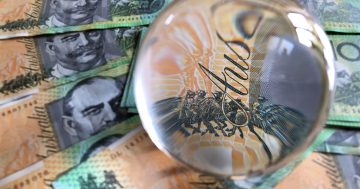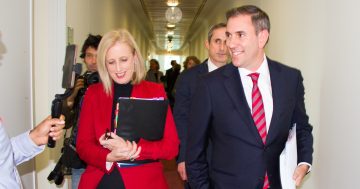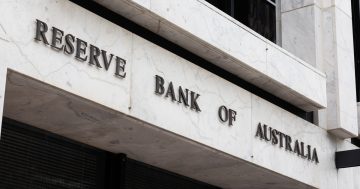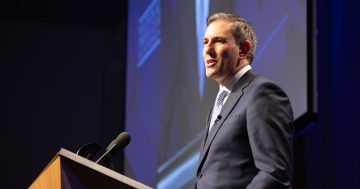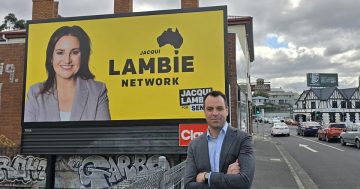Antony Funnell* says modern monetary theory is gaining traction, but can it knock out free-market capitalism?
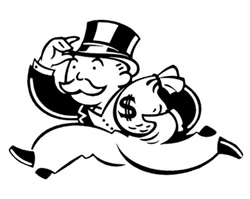 After more than four decades of dominance, free-market capitalism is facing a challenge.
After more than four decades of dominance, free-market capitalism is facing a challenge.
Its rival, the blandly named modern monetary theory (MMT), has entered the ring promising to return economic planning to a less ideological footing.
It’s also keen to strike a blow against the ‘surplus fetish’ that many economists now blame for declining public services and growing inequality.
The rise of MMT has received little attention in Australia, but it’s increasingly gaining exposure in the US.
Here’s how the contenders shape up.
The title holder
Whether we like to acknowledge it or not, free-market capitalism – often disparagingly referred to as ‘neoliberalism’ – dominates current thinking on both the centre-right of politics and the centre-left.
Once considered radical, it was legitimised in the late 1970s and early 1980s by political heavyweights Ronald Reagan and Margaret Thatcher.
At the heart of the free-market model is the mantra of smaller government, less taxation, and less regulation.
Over the decades this has led to:
- The privatisation of many government functions and agencies.
- A rejection of progressive taxation policies in favour of cutting tax levels for the wealthy (referred to by critics as trickle-down economics).
- The rebadging of virtually all forms of economic regulation as a burden (red tape).
Crucially, as part of the smaller government approach, free-market capitalism embraced the idea that elected representatives should be limited in their powers to manage and stimulate the economy.
That role was given over to central banks using ‘monetary policy’ – essentially raising and lowering interest rates to effect change.
There was also an emphasis on limiting public spending to achieve or maintain a surplus budget.
Deficits were not just undesirable, but irresponsible.
The contender
MMT, on the other hand, points an accusing finger at neoliberalism, blaming it for rising economic inequality and corresponding reductions in the quality and scope of essential services – both public and privatised.
MMT’s proponents argue that governments shouldn’t be afraid of pushing the economy into deficit if that deficit helps fund further economic growth.
Traditional monetary policy, they say, no longer makes sense in an era of record low interest rates or, in the case of Japan, negative interest rates.
And they believe there is a democratic as well as economic benefit to be had in once again having elected politicians more directly involved in efforts to stimulate and manage the economy.
What’s needed is a raft of stimulus measures, including a greater emphasis on what’s called ‘fiscal’ policy – the use of tax rates as a control lever.
Lightweight or heavyweight?
The major critique of MMT by conventional economic theorists is that it’s built on wishful thinking and treats the economy as a ‘magic pudding’.
They deride MMT as unsophisticated, as little more than a call for governments to simply ‘print more money’ to fund their programs.
Going into deficit to fund government spending, free-market economists say, can only ever lead to hyperinflation and risk sending the economy into recession.
Economist Steven Hail, a supporter of MMT, rejects that characterisation as deliberately misleading.
“What we are saying is that when there is a lack of spending in the economy, when there is already a lot of people with precarious employment or people who are underemployed – and when nobody in the medium term is forecasting any significant inflation – then under those circumstances the appropriate thing for the government to do is to stop talking about balancing its budget,” he says.
“The appropriate thing to do at that moment is to run a deficit deliberately to support the economy.”
In other words, all government borrowing that’s spent on infrastructure or services helps to create consumer demand and further commercial opportunity, which then helps grow the size of the overall economy.
At least that’s the MMT argument.
Professor Mitchell, an MMT pioneer from the University of Newcastle, argues the cap on the size of government stimulus spending, and therefore any deficit, should be determined by the productive capacity of a country.
That level will differ from country to country, he says, depending on an individual nation’s potential for growth.
The second limiting factor is inflation.
Once it becomes clear that inflation is likely to kick in, the Government should then limit spending and therefore the size of the deficit.
He rejects criticism of MMT theory as hypocritical.
“There was never a question [about government spending] in 2008 when the world was about to collapse into financial ruin when governments around the world pumped billions of their currency into the banking system to bail out the banks,” Professor Mitchell says.
“None of the bankers ever blinked.”
“And then, as soon as their positions were safe, they started again, criticising governments for various things – welfare spending, unemployment benefits, pensions, all the rest of it.”
Signs that neoliberalism could be on the ropes
One area of unacknowledged agreement between supporters of MMT and conventional economic practitioners is over the failure of standard monetary policy as a tool of economic management; specifically, the manipulation of interest rates to slow or speed economic growth.
“In the next recession, central banks will once again be back at zero interest rates and it will be very, very hard then for monetary policy to have the usual stimulative effect,” says James Mackintosh, a senior columnist with the Wall Street Journal.
“Clearly even those who are strong believers in the idea of monetary policy, Mario Draghi, President of the European Central Bank, for example, or Bill Dudley, who ran the New York Federal Reserve until recently, even these sorts of people are very much saying that governments need to come out and run big deficits because the central banks just can’t cut interest rates enough.”
Which sounds remarkably like an argument for MMT.
The view from outside the ring
The one sticking point though is trust in politicians.
Or more precisely, trust in their ability to act as responsible economic managers.
Would the general public be happy with parliamentarians having a greater hands-on role in stimulating and managing the economy?
Mackintosh has doubts.
And it seems many senior Australian financial experts feel the same way.
Mr Martin recently conducted a survey of 13 economists.
In response to the question of who was best placed to boost the economy, all 13 declared their preference for the Reserve Bank of Australia over the Federal Government.
Although – perhaps again with a nod to MMT – none suggested the Reserve Bank should be left to fight the current economic downturn on its own.
* Antony Funnell presents the ABC podcast Future Tense. He tweets at @antonyjfunnell.
This article first appeared at www.abc.net.au/news


